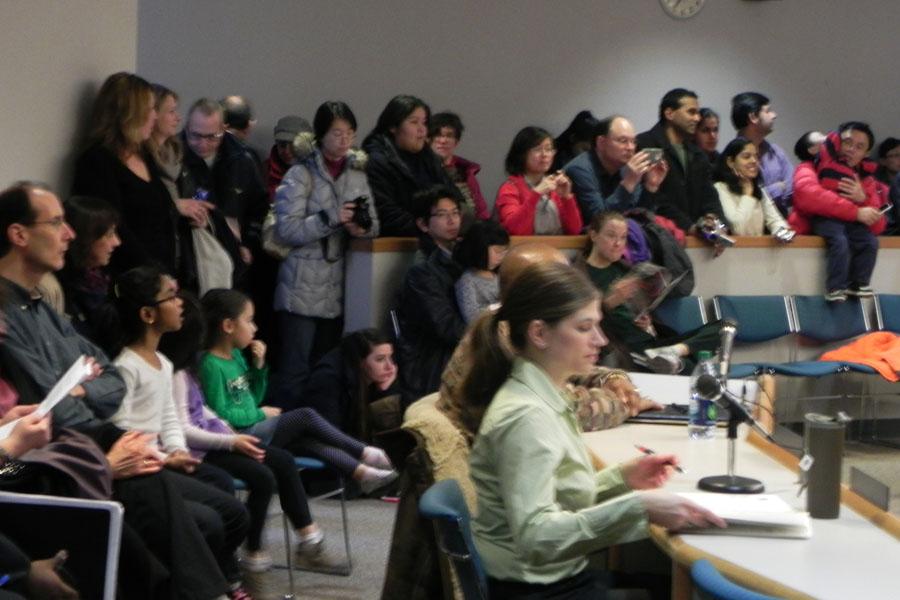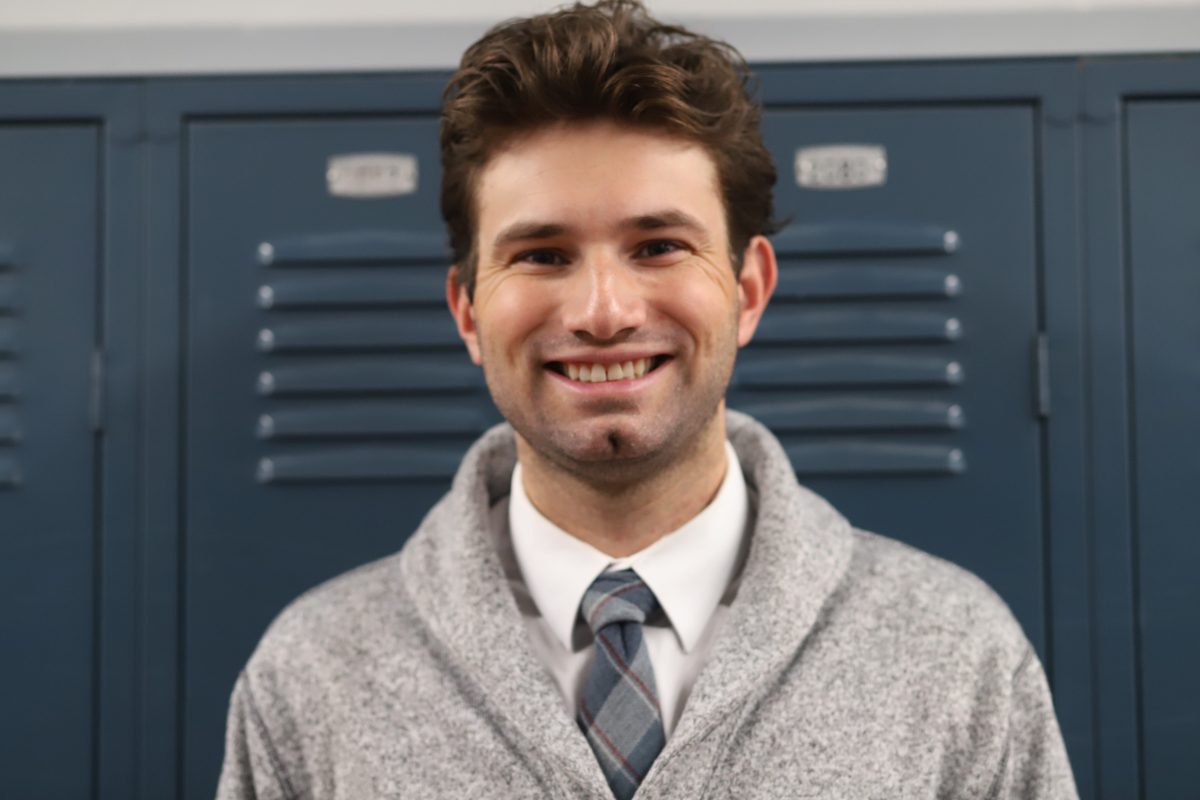At 7 p.m.Wednesday evening, March 13, the Ann Arbor Board of Education met on the fourth floor of the Ann Arbor District Library to discuss proposed measures for reducing costs for the 2013-2014 school year. And they were not alone. The meeting was well attended, with parents, students and advocacy groups all crammed into the conference room to speak their minds to their elected representatives.
After a musical performance about the life cycle of a tree and the formation of different rocks by students from Lawton Elementary, the Board got down to business. Nearly twenty community members, including five high school students, made speeches to the board about the inadvisability of cutting theater, reducing special education, evicting Roberto Clemente or eliminating block scheduling. Several people also criticized the salary of district superintendent Dr. Patricia Green and protested the treatment of three black high school football players who have been criminally charged in the wake of an on-field brawl.
Among the 80-some Ann Arborites present were two delegations of high school students, one from CHS’s Community Ensemble Theater and one from Pioneer Theater Guild. Along with directors and parent volunteers, the students made an impassioned defense of high school theater, bringing in personal anecdotes, budget figures and cost-benefit analysis as they urged the Board not to reduce the operating budget allocated to the district’s school theaters.
“Personally, I can’t imagine my high school experience without theater,” said CET student board president Gabrielle Vuylsteke, who spoke at the meeting.. “I don’t want future high school students to be denied the opportunities that I’ve had because of cost, and I don’t want theater to become less than what it is now.”
Although CET and PTG had arrived separately, the two groups soon banded together for a common cause, and stood up in unison each time a student or parent from either group took his or her turn at the podium. When Eleanor Howell-Shryock, the president and sole representative of the Huron Players, stood up to speak, she was joined in a touching show of solidarity by students from the other two theaters.
“I think that when [Howell-Shryock] spoke and she was all alone, and then the other theater groups got up behind her, it was a great moment,” said Louis Hochster, the publicity manager for CET’s board. Hochster will be playing Julius Caesar next weekend in CET’s upcoming winter production, and came to the meeting hoping to “make sure the board doesn’t cut theater by showing them how much we want it.”
Brice O’Neal, the parent technical director for CET, also attended the meeting, and made a speech to the board about how, as a student at Huron, theater saved his life by giving him a purpose and a community. “I was the kid that couldn’t afford the dues, that couldn’t afford the extra stuff,” O’Neal said. “It was because [theater] was funded that I can stand here now.”
The emotional impact of theater was a big topic in many of the speeches. Sena Adjei, an actor with PTG, talked about how theater transformed his life. “As African American males, my friends and I have been raised to be athletes, to think that we should be a certain thing. When I started in the theater guild, my whole life was just completely changed. I found people and a place where I felt I was really, really at home.”
Kate Summer, a stage manager from PTG, also talked about how much theater means to her. “Nearly everyone in Theatre Guild has a story of how it has helped them and changed their life,” said Summers. “Mine is one of two learning disabilities and a self confidence that was nearly shattered because of them. But it was Theatre Guild that saved me. It gave me opportunities that no other organization, sport or class could have ever taught me.”
In her speech, Vuylsteke quoted CET Student Tech Director Rachel Blakemore, who said that theater gave her the confidence to become a better leader, as well as teaching her so much about technical theater that she now runs lights and sound for most events in Community’s Craft Theater. Vuylsteke also read a letter from last year’s CET president and Thespian of the Year Jessica Shapiro, who would have dropped out of school if it hadn’t been for theater.
“You could go ahead and call CET my hook back into reality,” Shapiro had written. “It didn’t take long for me to decide to graduate [after I discovered theater]. How could a dropout be involved in an after-school program? By my junior year, I had a total of six credits. So, of course it took me an extra year and a lot of hard work to graduate. But in a single year, I racked up about 14 credits.”
Several speakers emphasized the value of theater to both students and the community. O’Neal said that the same math used to calculate the scope of lighting areas for theater was on the MME this year, and Vuylsteke argued that having theater as an extracurricular on their applications can be instrumental in helping students get into college.
Howell-Shryock pointed out how important theater is for the community at large. “For some of the people who come to see our shows, Huron is the only place they can experience theater, aside from tedious forced readings of Shakespeare in English class,” said Howell-Shryock.
Margie Morris, the PTO treasurer for both CET and PTG, brought in several economic arguments for keeping theater funded. According to Morris, 12.8% of the population of CHS was involved in CET’s “Evita” last fall, and 16.3% of Pioneer’s population is a part of PTG. Morris said that in CET, only families who feel they can afford to pay dues are asked to contribute, and in PTG, scholarships are available to everyone who asks for them. Since 40% of PTG participants are on full or partial scholarship, “a complete cut in funding would render us far less able to serve the number of students that we do and certainly not to be as successful as we are.”
She wasn’t the only one to emphasize the effects budget cuts could have on theater. Howell-Shryock pointed out that, “As a program that has no dues, and already sells candy avidly, cutting the theater budget at Huron would be a death sentence for us. We might be able to hold on for a year or so, maybe using pay to play tactics—pun intended—but that would cut off an entire group of students from participating.”
As the speeches drew to a close and the assembled Ann Arborites prepared to leave for the night, the Board members emphasized that they were in no way in favor of reducing funding to any special programs, and would rather invest incrementally in education than continue cutting it to make ends meet. Trustee Glenn Nelson pointed out that this battle didn’t have to end in the Ann Arbor Public Schools district, and that motivated individuals should consider protesting the cuts at the county and state level.
Certainly, the fight isn’t over for the student actors and crew members of Ann Arbor high schools. Board members of CET, PTG and Skyline theater met on Saturday to discuss joining their forces, and are planning to paint The Rock April 14 to get publicity for their cause and show their dedication. Some of these students have dedicated their high school lives to theater, and they’re not going to give in without a fight.

















